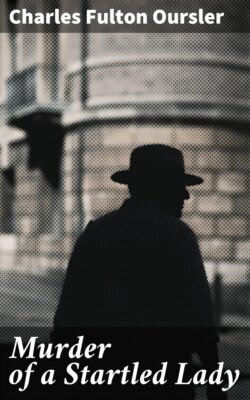Читать книгу Murder of a Startled Lady - Charles Fulton Oursler - Страница 3
На сайте Литреса книга снята с продажи.
Introduction
ОглавлениеTable of Contents
The truth about the case of the foundling bones should have been apparent from the start. At least, on looking back, it seems so to me. I believe that almost from the beginning, Police Commissioner Thatcher Colt had an idea of the nature of the deed and how it was committed. The problem was to prove it, and in this process, so Colt maintains, the Police Department and not himself deserves all praise. As to that, I make no comment, except to remind the reader that the only reason Thatcher Colt has permitted me to publish these memoirs is for the greater glory of the department which he administered so fairly and efficiently under two Mayors, of opposite political faiths. Colt's love for the Police Department is thorough and sincere; he is anxious to win public respect and support for the blue-coats in the war against crime. Some years ago, in presenting the first of these mysteries of New York to the public, I made a few remarks which may bear repeating now:—
"When Mr. Thatcher Colt was Police Commissioner of the City of New York he was confronted with a number of mysterious crimes. In the face of grave difficulties, not all of which were known to the public, he personally conducted the investigations and, under handicaps that might have discouraged a less determined man, he solved the cases, caused the arrest of the guilty persons and saw them convicted. Yet the credit for his detective work was given to others. Recently Mr. Colt was approached with the proposal that the facts in these startling cases be published. At first he declined, on the wholly reasonable grounds that it might appear he was seeking honour for himself. The argument which finally persuaded the former commissioner was that he would bring honour to a place where it is too often a stranger—the police department.
"It is all too true that the American public does not sufficiently appreciate its police. There is a romantic fallacy that the Force is hopeless when faced with a clever crime; indeed many persons hold the departments of the country in contempt and derision. From short stories and novels they seem to have gained the impression that puzzling crimes are solved only by brilliant amateurs. These whimsical creatures of the story-teller's imagination, a printed army of amiable dilettanti of the current fiction, are gentlemen of inexhaustible knowledge and accomplishment. They are experts in chemistry and astronomy, psycho-analysis and fire-arms; they know rugs, music, chess and wines; they are languid fellows with a great fund of humour, and a mischievous liking for cryptic utterances until they are ready to put a delicate finger on the malefactor. Their avocation is to catch elusive murderers, when the police detectives are ready to confess their utter ineptitude for their own business.
"Of course there are no such detectives in real life. Yet the crimes of reality are infinitely stranger than the fanciful misdeeds which these imaginary detectives are asked to unravel. The police face crime and mystery as a part of their daily routine, and they solve their cases by knowing their business and attending to it—by vast and competent organisation, patience and determined hard work, together with some ingenuity and an occasional streak of good luck...."
These were the methods employed in dealing with the mystery of the box of bones. They are described here just as I saw them performed; perhaps you will anticipate the solution long before I did. As I said before, it was perfectly obvious almost from the beginning—or should have been.
ANTHONY ABBOT.
